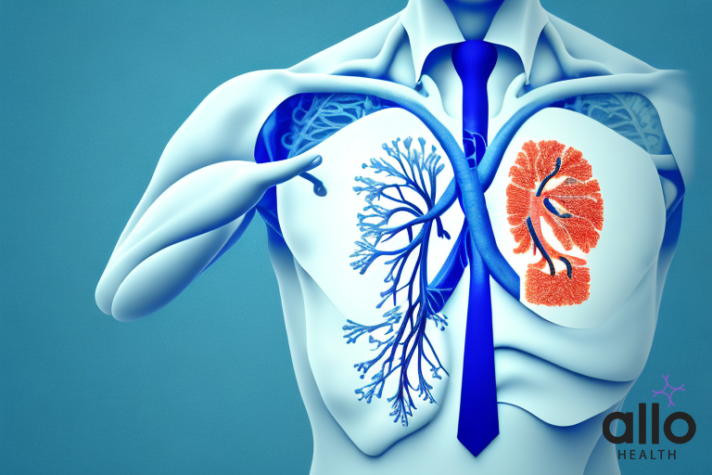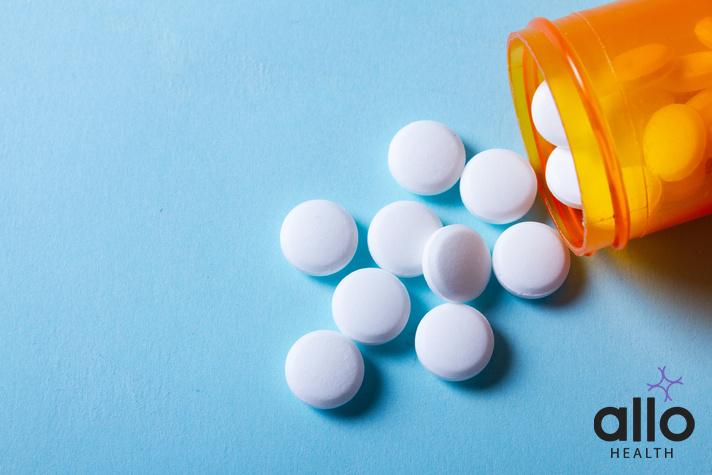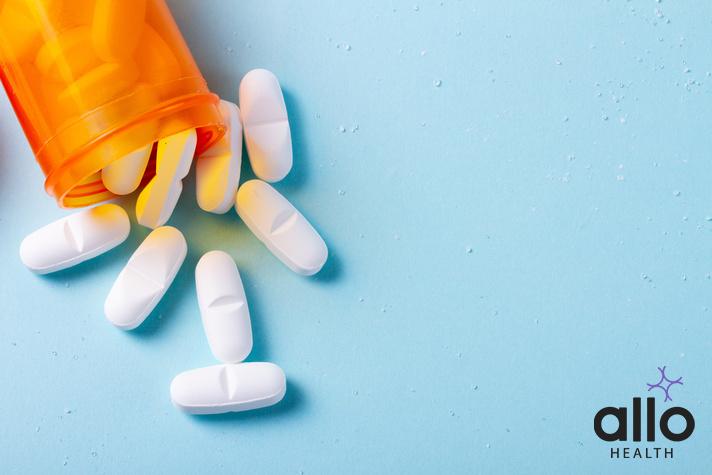Exploring The Side Effects Of Sildenafil For Pulmonary Hypertension

Allo Health is dedicated to personalized well-being, offering support and trusted information tailored to individual health goals. The platform emphasizes human-generated content, led by a distinguished medical team of experts, including physicians and sexual health specialists. Their commitment to credibility involves rigorous fact-checking, authoritative research, and continuous updates to ensure accurate, up-to-date information. Allo Health's unique approach goes beyond conventional platforms, providing expert-led insights and a continuous commitment to excellence, with user feedback playing a crucial role in shaping the platform's authoritative voice.

Dr.Sushma.V completed MBBS degree from BGS GIMS,bangalore
Why This Was Upated?
Our experts continually monitor the health and wellness space, and we update our articles when new information became available.
Updated on 03 June, 2024
- Article was updated as part of our commitment to diversity, equity, and inclusion.

"The following blog article provides information about a drug or brand name drug and its potential effects or benefits. However, it is crucial to understand that this information is intended for general educational purposes only and should not be considered a substitute for professional medical consultation. It is highly recommended to consult with a qualified healthcare professional before making any decisions regarding medication, treatment, or healthcare management.
Book consultation
Individuals have unique medical conditions, and the information provided in this article may not be applicable to everyone. Only a qualified healthcare provider can evaluate your specific medical situation, taking into account your medical history, conducting appropriate tests, and providing personalized advice and recommendations. They are equipped to make informed decisions tailored to your individual needs.
It is crucial to emphasize that self-diagnosis, self-medication, or disregarding medical advice can have serious health consequences. This article may reference specific brand names or drugs for illustrative purposes. Mention of these names does not imply endorsement, recommendation, or guarantee of their efficacy or safety. The choice of medication should be based on discussions and individualized guidance from a healthcare professional who has a comprehensive understanding of your medical condition.
"Sildenafil, commonly known as Viagra, is a medication widely used to treat erectile dysfunction. But, it has also been approved by the US FDA to treat a condition called pulmonary hypertension (PH). PH is a chronic and debilitating condition that affects the arteries in the lungs, causing high blood pressure and difficulty in breathing. Sildenafil helps to relax the blood vessels and improve blood flow in the lungs, thereby reducing the symptoms of PH. But, as with any medication, it may cause some side effects. In this article, we will explore the various side effects of sildenafil for PH, the precautions to take while using it, and alternative treatments.
What Is Sildenafil?
Sildenafil is a medication primarily used to treat erectile dysfunction (ED), a condition where a man has difficulty achieving or maintaining an erection sufficient for sexual activity. It belongs to a class of drugs known as phosphodiesterase type 5 (PDE5) inhibitors.
Here are some key points about sildenafil:
Mechanism of Action:
- Sildenafil works by inhibiting the enzyme phosphodiesterase type 5 (PDE5). This enzyme is responsible for breaking down cyclic guanosine monophosphate (cGMP), a substance that plays a crucial role in relaxing smooth muscle tissues in the penis.
- Inhibition of PDE5 results in increased levels of cGMP, leading to enhanced blood flow to the penis. This improved blood flow helps in achieving and sustaining an erection during sexual stimulation.
Brand Names: Sildenafil is most commonly known by the brand name Viagra. But, there are also generic versions available under different brand names.
Administration:
- Sildenafil is typically taken orally as a tablet, usually about 30 minutes to an hour before engaging in sexual activity.
- The drug should not be taken more than once a day, and the effectiveness may vary from person to person.
Generic Versions: Generic sildenafil is available and is often more affordable than the brand-name Viagra. Generic versions must meet the same quality and safety standards as the original medication.
The information provided here is a general overview, and individual cases may vary. Consultation with a healthcare professional is recommended before starting any medication, and they can provide personalized advice based on an individual’s health history and current medications.
Sildenafil Uses & Benefits
Sildenafil is primarily used to treat erectile dysfunction (ED), but it also has other medical applications. Here are the uses and benefits of sildenafil in detail:
Erectile Dysfunction (ED):
- Primary Use: Sildenafil is most commonly prescribed to treat erectile dysfunction in men. It helps men achieve and maintain an erection by increasing blood flow to the penis during sexual stimulation.
- Effectiveness: Clinical studies have shown that sildenafil is effective in a significant percentage of men with ED, regardless of the underlying cause, whether it’s physical, psychological or a combination of both.
Pulmonary Arterial Hypertension (PAH):
- Secondary Use: Sildenafil is approved for the treatment of pulmonary arterial hypertension (PAH), a condition characterized by high blood pressure in the arteries that supply the lungs.
- Mechanism of Action: In PAH, sildenafil works by relaxing the smooth muscles in the walls of the pulmonary arteries, leading to a reduction in pulmonary blood pressure and an improvement in exercise capacity.
Altitude Sickness:
- Research: Some studies have explored the potential use of sildenafil in preventing and treating high-altitude pulmonary edema (HAPE) and high-altitude pulmonary hypertension (HAPH). These conditions can occur at high altitudes and are associated with reduced oxygen levels.
Raynaud’s Phenomenon:
- Investigational Use: There is ongoing research regarding the use of sildenafil in the treatment of Raynaud’s phenomenon, a condition characterized by reduced blood flow to certain parts of the body, typically the fingers and toes, in response to cold or stress.
Antidepressant-Induced Sexual Dysfunction:
- Exploratory Use: Sildenafil has been studied for its potential to alleviate sexual dysfunction caused by certain antidepressant medications, particularly selective serotonin reuptake inhibitors (SSRIs). It may help counteract the negative impact of these medications on sexual function.
Exercise Performance:
- Research Interest: Some studies have explored the potential of sildenafil to enhance exercise performance, especially in conditions where improved blood flow might have a positive impact, such as in athletes or individuals with certain cardiovascular conditions.
Repurposing:
- Ongoing Investigations: Sildenafil, along with other PDE5 inhibitors, is being investigated for potential applications in various medical conditions, including neurodegenerative diseases and certain types of cancer. But, these uses are still in the early stages of research.

While sildenafil has shown efficacy in treating specific conditions, it should only be used under the supervision and prescription of a healthcare professional. Individual responses to the medication can vary, and potential side effects and interactions should be considered. Always consult with a healthcare provider for personalized advice based on your medical history and current health status.
Sildenafil Side Effect & Precautions
Sildenafil, like any medication, can have side effects, and there are precautions to consider before using it. Not everyone will experience these side effects, and some individuals may tolerate the medication well. Here are common side effects and precautions associated with sildenafil:
Common Side Effects:
- Headache: Sildenafil can cause headaches, which are among the most commonly reported side effects. These headaches are usually mild to moderate in severity.
- Facial Flushing: Some individuals may experience facial flushing or redness of the face.
- Indigestion: Sildenafil can cause indigestion or upset stomach.
- Nasal Congestion: Stuffy or runny nose is another possible side effect.
- Visual Disturbances: Some people may experience changes in vision, such as blurred vision, sensitivity to light, or a temporary blue tinge to their vision.
- Dizziness: Sildenafil may cause dizziness or lightheadedness, especially when standing up from a sitting or lying position.
- Priapism: While rare, priapism (prolonged and painful erection lasting more than four hours) is a serious side effect that requires immediate medical attention.
Precautions and Considerations:
- Nitrates and Nitric Oxide Donors: Sildenafil should not be taken with nitrates or nitric oxide donors (often prescribed for chest pain) as it can lead to a dangerous drop in blood pressure.
- Cardiovascular Conditions: Individuals with a history of cardiovascular diseases, including heart attack, angina, or arrhythmias, should use sildenafil with caution. A healthcare provider should assess the risks and benefits.
- Hypotension: Sildenafil can cause a decrease in blood pressure, particularly when taken with other medications that lower blood pressure. Caution is advised, especially in those prone to hypotension.
- Liver and Kidney Conditions: Sildenafil is metabolized in the liver and excreted through the kidneys. Individuals with liver or kidney concerns may need dosage adjustments, and their use of sildenafil should be closely monitored.
- Retinal Disorders: People with retinal disorders, such as retinitis pigmentosa, should use sildenafil cautiously due to the potential for changes in vision.
- Penile Anomalies: Sildenafil should be used with caution in individuals with anatomical abnormalities of the penis, such as Peyronie’s disease.
- Drug Interactions: Sildenafil can interact with certain medications, including alpha-blockers, antifungal drugs, and HIV protease inhibitors. Inform your healthcare provider about all medications you are taking.
- Allergies: Individuals with known hypersensitivity or allergies to sildenafil or its components should avoid using the medication.
It’s crucial to consult with a healthcare professional before using sildenafil, especially if you have underlying health conditions or are taking other medications. They can provide personalized advice based on your medical history and assess the potential risks and benefits of using sildenafil in your specific case. If you experience any severe or persistent side effects, seek medical attention promptly.
Exploring The Side Effects Of Sildenafil For Pulmonary Hypertension
Sildenafil is used for the treatment of pulmonary arterial hypertension (PAH), a condition characterized by high blood pressure in the arteries that supply the lungs. The side effects associated with sildenafil use for PAH are generally similar to those observed when it is used for erectile dysfunction. Here is a detailed exploration of the side effects specific to the use of sildenafil for pulmonary hypertension:
Common Side Effects:
- Headache: Headaches are a common side effect of sildenafil and may occur in individuals using it for PAH. These headaches are typically mild to moderate in intensity.
- Flushing: Facial flushing or redness of the face can occur. This is a result of increased blood flow to the skin.
- Indigestion: Sildenafil may cause indigestion or an upset stomach. Taking the medication with food may help alleviate this symptom.
- Nasal Congestion: Some individuals may experience nasal congestion or a runny nose.
- Dizziness: Sildenafil can cause dizziness or lightheadedness, particularly when standing up from a sitting or lying position. This effect may be more pronounced in individuals with PAH.
Less Common Side Effects:
- Visual Disturbances: Changes in vision, such as blurred vision, sensitivity to light, or a temporary blue tinge to vision, can occur.
- Priapism: While rare, priapism (prolonged and painful erection lasting more than four hours) is a serious side effect that may occur in both men and women using sildenafil for PAH.
Serious Side Effects:
- Hypotension: Sildenafil can cause a decrease in blood pressure. In individuals with PAH, who may already have compromised cardiovascular function, caution is required to prevent excessive lowering of blood pressure.
- Cardiovascular Events: Rare cases of cardiovascular events, including heart attack, stroke, and sudden cardiac death, have been reported in individuals using sildenafil. This is more relevant to those with pre-existing cardiovascular conditions.
- Vision Loss: Sudden vision loss, attributed to non-arteritic anterior ischemic optic neuropathy (NAION), has been reported rarely. Individuals with a history of NAION or other visual disorders should exercise caution.
Precautions:
- Nitrates and Nitric Oxide Donors: Sildenafil should not be used with nitrates or nitric oxide donors, as this combination can lead to a dangerous drop in blood pressure.
- Other Medications: Inform your healthcare provider about all medications you are taking, as sildenafil can interact with certain drugs, including alpha-blockers and antifungal medications.
- Underlying Health Conditions: Individuals with certain underlying health conditions, such as liver or kidney concerns, should use sildenafil with caution, and their healthcare provider may adjust the dosage accordingly.
- Allergies: If you have a known hypersensitivity or allergy to sildenafil or its components, it is crucial to avoid its use.
For individuals using sildenafil for PAH to have regular check-ups and follow-ups with their healthcare provider to monitor their response to the medication and assess any potential side effects. Any concerns or unusual symptoms should be promptly reported to a healthcare professional. Always take medications as prescribed and follow the guidance provided by your healthcare provider.

Sildenafil Drug Interactions
Sildenafil can interact with various medications, potentially affecting its effectiveness, increasing the risk of side effects, or leading to other complications. It’s crucial to inform your healthcare provider about all the medications, supplements, and herbal products you are taking to avoid potential drug interactions. Here is a detailed overview of some significant drug interactions with sildenafil:
Nitrates and Nitric Oxide Donors:
- Interaction: Sildenafil should not be used with nitrates (nitroglycerin, isosorbide dinitrate, isosorbide mononitrate) or nitric oxide donors (such as amyl nitrite).
- Effect: The combination can lead to a significant drop in blood pressure, which may be life-threatening.
Alpha-Blockers:
- Interaction: Sildenafil can enhance the blood pressure-lowering effects of alpha-blockers (doxazosin, tamsulosin, terazosin).
- Effect: Co-administration may lead to symptomatic hypotension (low blood pressure). Adjustments in dosage may be necessary.
Antihypertensive Medications:
- Interaction: Sildenafil can potentiate the hypotensive effects of other antihypertensive medications.
- Effect: Caution is advised, especially in individuals taking medications to lower blood pressure.
Protease Inhibitors (for HIV Treatment):
- Interaction: Sildenafil metabolism is inhibited by certain HIV protease inhibitors (ritonavir, saquinavir).
- Effect: Co-administration can lead to increased sildenafil levels, potentially increasing the risk of side effects.
CYP3A4 Inhibitors:
- Interaction: Medications that inhibit the enzyme CYP3A4, such as ketoconazole, itraconazole, erythromycin, and cimetidine, can increase sildenafil levels.
- Effect: Elevated sildenafil levels may increase the risk of side effects.
Guanylate Cyclase Stimulators:
- Interaction: Co-administration with guanylate cyclase stimulators (riociguat) is contraindicated.
- Effect: This combination can lead to severe hypotension.
Other PDE5 Inhibitors:
- Interaction: Concurrent use of other phosphodiesterase type 5 (PDE5) inhibitors (such as tadalafil or vardenafil) is not recommended.
- Effect: Increased risk of side effects without additional benefits.
Riociguat:
- Interaction: Concurrent use with riociguat, a guanylate cyclase stimulator, is contraindicated.
- Effect: May lead to severe hypotension.
Grapefruit Juice:
- Interaction: Grapefruit juice may increase sildenafil levels by inhibiting CYP3A4.
- Effect: This could potentially amplify the side effects of sildenafil.
Alpha-Agonists:
- Interaction: Sildenafil may enhance the blood pressure-lowering effects of alpha-agonists. – Effect: Caution is advised, particularly in individuals taking medications such as clonidine or guanfacine.
This list is not exhaustive, and other medications may also interact with sildenafil. Always consult with your healthcare provider before starting or stopping any medication while using sildenafil. Inform them of your complete medical history and all the medications you are taking to ensure safe and effective use of sildenafil.
Most Asked Questions
-
What are the common side effects of using sildenafil for pulmonary hypertension?
Common side effects of sildenafil for pulmonary hypertension include headaches, facial flushing, indigestion, nasal congestion, and dizziness. These side effects are generally mild to moderate and often diminish with continued use.
-
Is there a risk of serious side effects when using sildenafil for pulmonary hypertension?
While serious side effects are rare, they can occur. These may include hypotension (low blood pressure), cardiovascular events, and, rarely, vision loss. It is essential to promptly report any unusual symptoms to your healthcare provider.
-
Can sildenafil interact with other medications used for pulmonary hypertension?
Yes, sildenafil can interact with certain medications. It should not be used with nitrates, nitric oxide donors, or alpha-blockers. Inform your healthcare provider about all medications you are taking to prevent potential interactions.
-
Are there specific precautions to consider when using sildenafil for pulmonary hypertension?
Precautions include avoiding nitrates, informing your healthcare provider about other medications, and using caution if you have cardiovascular conditions. Regular check-ups and monitoring are recommended to assess your response to the medication.
-
Can sildenafil be used by individuals with underlying health conditions like liver or kidney concerns?
Individuals with liver or kidney concerns should use sildenafil with caution, and dosage adjustments may be necessary. It's crucial to communicate your medical history to your healthcare provider for personalized guidance on sildenafil use.






































